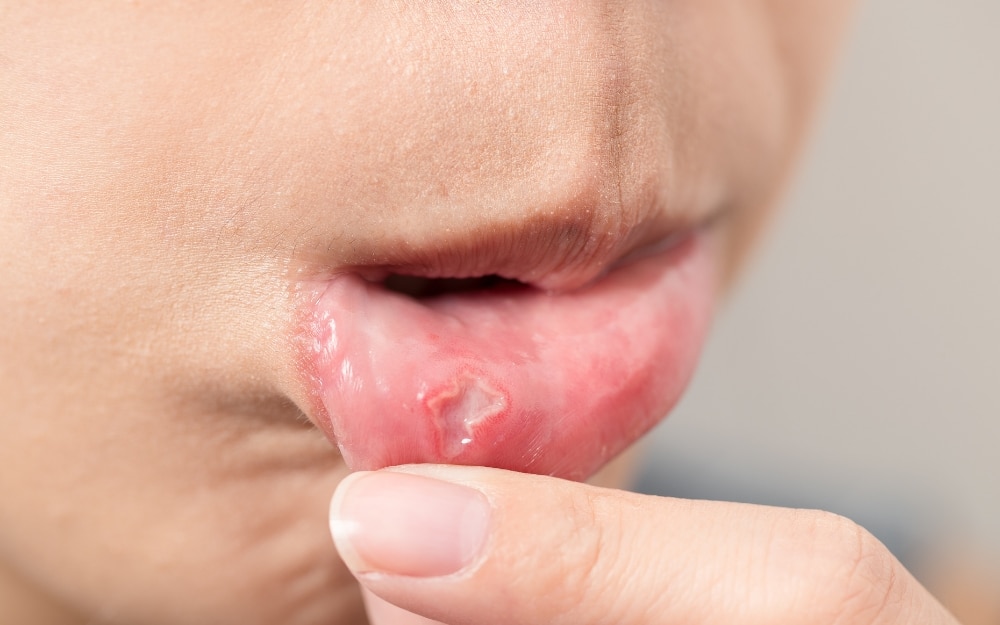Mouth ulcers
Tea tree oil mouth ulcers

Mouth ulcers — also known as canker sores — are small, painful lesions that develop inside the mouth, on the gums, inner cheeks, tongue or lips. They can make eating, drinking and even talking uncomfortable. While they’re generally harmless and heal within a week or two, the pain can be frustrating, and for some people, ulcers recur frequently.
If you prefer natural remedies over medicated gels or rinses, you may be interested in tea tree oil — a plant-based oil known for its soothing and healing qualities.
Why tea tree oil can help
Tea tree oil is extracted from the leaves of Melaleuca alternifolia, a plant native to Australia and used for centuries in traditional medicine. Modern research supports many of its natural healing properties, including:
- Antimicrobial action – Helps reduce bacteria, fungi and other microbes in the mouth, preventing infection and allowing the ulcer to heal faster.
- Anti-inflammatory benefits – Can soothe swelling and redness around the sore, making it less painful.
- Wound-healing support – Keeps the affected area clean, which can speed up your body’s natural recovery process.
- Pain relief – Some people report a mild numbing effect, which may help reduce discomfort when eating or speaking.
By keeping the ulcer clean and reducing inflammation, tea tree oil creates a better environment for healing.
How to use tea tree oil for mouth ulcers
Important: Tea tree oil is very potent and should never be applied undiluted inside the mouth. Always dilute it first to avoid irritation or chemical burns.
Here are a few safe, effective ways to use tea tree oil for mouth ulcers:
Tea tree oil mouth rinse
A mouth rinse is an easy way to target multiple sores or general mouth irritation.
You’ll need:
- 2–3 drops of tea tree oil
- 1 cup (250ml) of warm water
How to use:
- Add the tea tree oil to the warm water.
- Swish the mixture around your mouth for 20–30 seconds, focusing on the ulcer area.
- Spit it out — do not swallow.
- Repeat up to twice daily until the ulcer improves.
Tea tree oil and coconut oil dab
This is ideal for targeting one or two small ulcers.
You’ll need:
- 1 drop of tea tree oil
- 1 teaspoon of coconut oil (or olive oil)
How to use:
- Mix the tea tree oil with the coconut oil in a small, clean container.
- Dip a clean cotton bud into the mixture.
- Gently dab it directly onto the ulcer.
- Leave it for a few minutes before rinsing your mouth with plain water.
- Repeat up to twice a day.
Why coconut oil? It’s soothing, tastes pleasant and has mild antibacterial properties of its own.
Adding to a salt water rinse
Salt water rinses are a classic home remedy for mouth sores. Adding tea tree oil can make them even more effective.
You’ll need:
- ½ teaspoon salt
- 1 cup warm water
- 1–2 drops tea tree oil
How to use:
- Dissolve the salt in warm water.
- Add tea tree oil and stir well.
- Swish for 20–30 seconds, then spit out.
- Use once or twice a day.
Safety precautions
While tea tree oil is natural, it’s also strong and should be used with care:
- Do not swallow tea tree oil — it can be toxic if ingested in larger amounts.
- Always dilute before applying inside the mouth.
- Avoid use in children under 6 years old without professional guidance.
- Pregnant or breastfeeding women should consult a healthcare provider before use.
- If you experience any side effects using tea tree oil such as burning, swelling, rash or worsening pain, stop use immediately.
- Store tea tree oil in a cool, dark place away from children and pets.
When to see a doctor
Most mouth ulcers are harmless and will heal on their own. However, see a healthcare professional if:
- The ulcer is unusually large or extremely painful.
- It lasts longer than two weeks.
- You develop a fever, swollen lymph nodes or feel unwell.
- You have frequent recurring ulcers.
- You notice ulcers spreading or accompanied by white patches or sores elsewhere in the mouth.
These may indicate a more serious condition that needs medical treatment.
Tea tree oil can be a gentle yet effective way to help manage mouth ulcer discomfort, reduce bacteria and support healing — as long as you use it safely and in the correct dilution.
Combined with good oral hygiene and a healthy diet, it may shorten recovery time and make the healing process more comfortable.
If your symptoms persist or worsen, always seek professional medical advice. Natural remedies are helpful, but they work best alongside — not instead of — proper medical care.
Disclaimer
The content on this website is not intended to be a substitute for professional medical advice, diagnosis, or treatment. Always seek medical advice for any questions regarding a medical condition.

